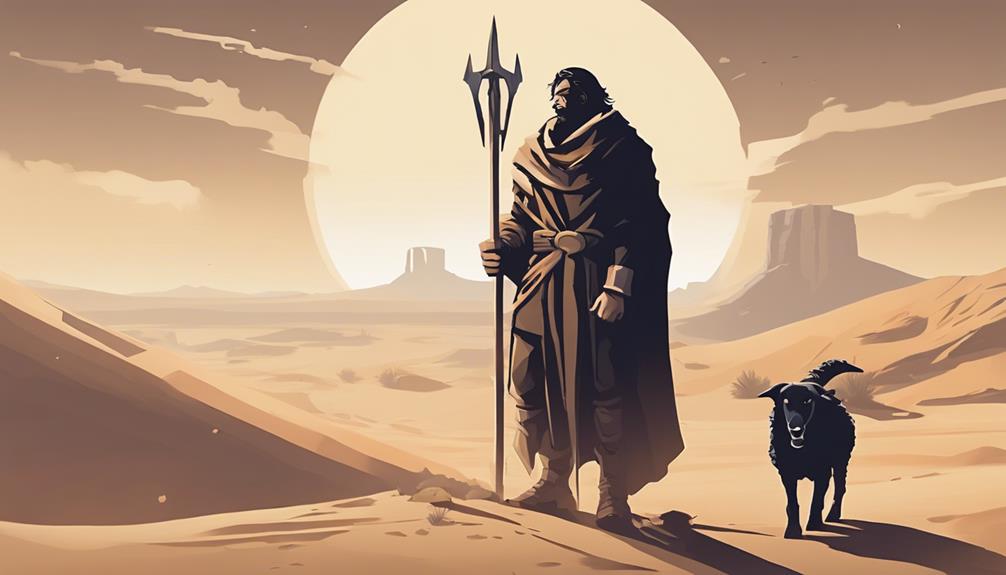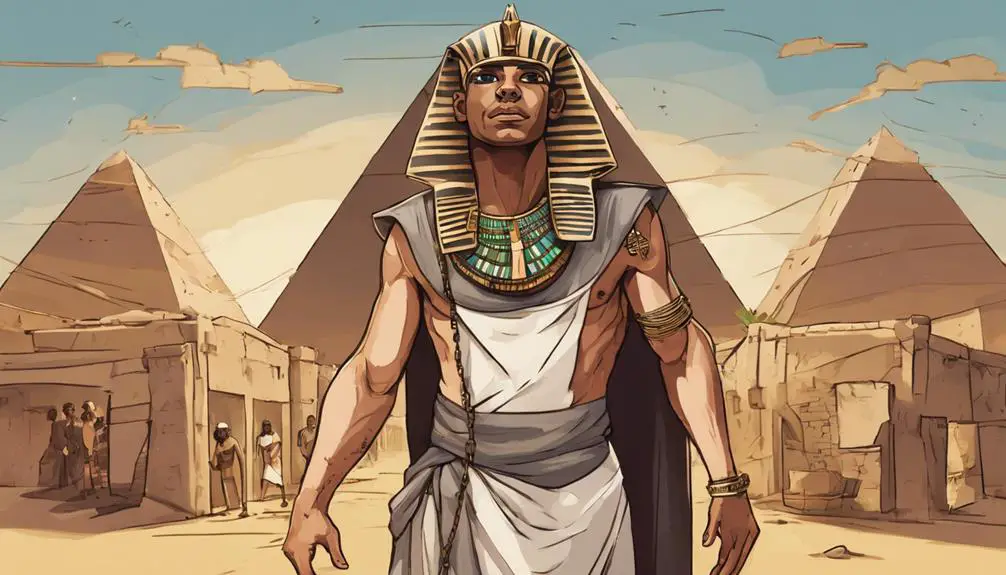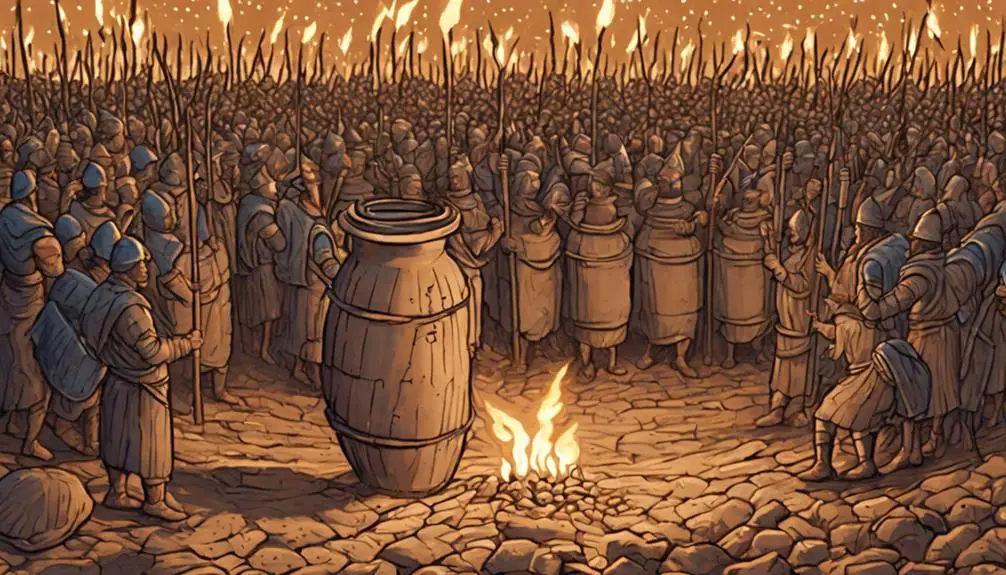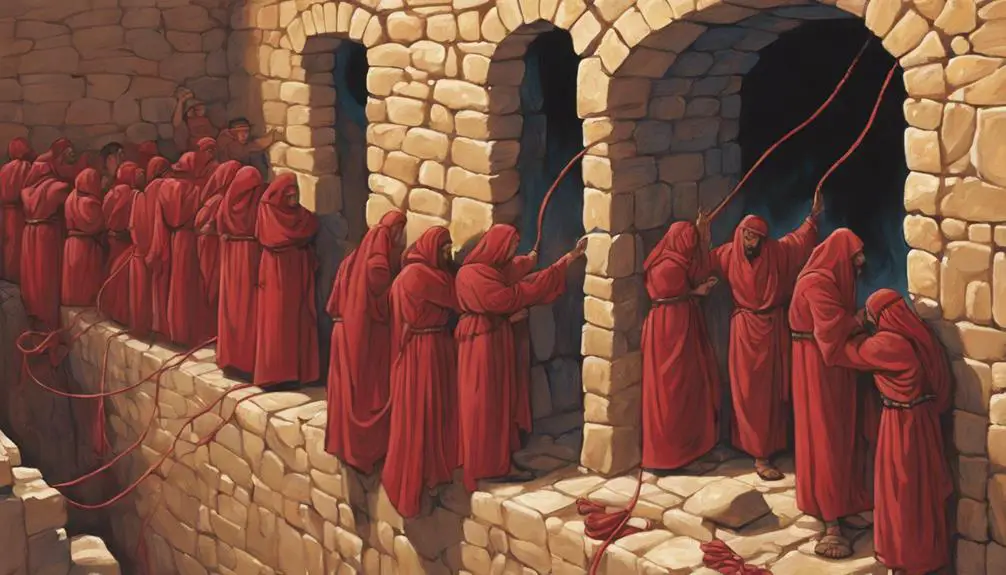Discover how the Bible's underdog stories offer timeless lessons on overcoming impossible odds, igniting a spark of curiosity and hope.

Underdogs in the Bible
In the ultimate plot twist of ancient texts, you'd be surprised to find the Bible acting like the original underdog story playbook. From David's viral victory over Goliath to Joseph's rise from a pit to the pinnacle of Egyptian power, these narratives aren't just ancient history—they're lessons in perseverance, faith, and unexpected success.
But here's the real kicker: each of these underdogs brings to the table a unique blend of humility, courage, and sheer audacity that seems almost tailored for modern inspiration. So, why should you care? Because their stories might just hold the key to understanding resilience in the face of seemingly insurmountable odds.
Key Takeaways
- Faith and courage are pivotal in transforming underdogs into victors in biblical narratives.
- Strategic planning and diplomacy play crucial roles in overcoming adversity.
- Divine guidance and selection highlight the importance of moral rightness over conventional strength.
- The stories of biblical underdogs emphasize the transformative power of bravery and wisdom in challenging times.
David and Goliath: A Classic Tale

Delving into the tale of David and Goliath, we uncover a quintessential narrative that challenges the notion of might versus right within a biblical context. Here, the size disparity between the young shepherd David and the giant Goliath isn't just a physical confrontation but a symbolic battle of faith versus fear. This story, deeply embedded within religious teachings, provides a profound lesson on overcoming fear through faith and wisdom rather than sheer physical strength.
You're invited to analyze how David, equipped with nothing but a sling and a few stones, confronts Goliath, a warrior clad in heavy armor. This size disparity isn't merely a detail; it's central to understanding the narrative's moral. The message is clear: physical size and strength don't determine the outcome of a battle when one has moral rightness and divine support on their side.
Moreover, David's refusal to wear armor, relying on his skill with a sling, underscores a deeper truth about overcoming fear. It's not the size of the warrior in the fight, but the size of the fight in the warrior, driven by faith and righteousness, that truly matters.
Esther's Courageous Victory

In the story of Esther, we observe a remarkable instance of bravery as she navigates the complexities of royal politics to save her people from annihilation. Her ascent to queen within the Persian Empire unfolds against a backdrop of royal intrigue, where power plays and hidden agendas simmer beneath the surface. Yet, Esther's story transcends the mere machinations of court life, embodying a profound example of feminine bravery in the face of overwhelming odds.
Esther's courage isn't impulsive but measured, reflecting a deep commitment to her people's survival. She leverages her position within the royal court, engaging in a high-stakes game of diplomacy and strategic planning. Her actions reveal a keen understanding of the intricacies of royal power dynamics, as she skillfully orchestrates a plan to thwart the genocide of the Jewish people.
This narrative does more than recount a tale of survival; it underscores the significant impact of individual agency within broader socio-political contexts. Esther's story challenges prevailing notions of power, demonstrating how feminine bravery, when wielded with wisdom and foresight, can alter the course of history. In doing so, it offers a compelling study of leadership, resilience, and the transformative potential of courage in the face of adversity.
Joseph: From Slave to Governor

Joseph's journey from a mere slave in Egypt to its governor encapsulates a profound narrative of resilience, strategic acumen, and divine providence, demonstrating how adversity can be transformed into opportunity. His story begins with a profound brothers' betrayal, rooted in jealousy of his abilities and his father's favoritism. Sold into slavery, Joseph's life appears to take a downward spiral. However, his unique skill in dream interpretation sets the stage for an unforeseen ascension.
In Egypt, Joseph's ability to decipher dreams catches the attention of Pharaoh, particularly his accurate prediction of seven years of plenty followed by seven years of famine. This moment underscores the pivotal role of dream interpretation in ancient Near Eastern cultures, serving not only as a form of divine communication but also as a critical survival tool. Joseph's insight and strategic planning in storing surplus grain exemplify his keen understanding of resource management and long-term planning.
Elevated to governor, Joseph's journey isn't merely a tale of personal triumph but a demonstration of how strategic foresight, coupled with an unwavering faith, can overturn the most dire circumstances. His eventual reconciliation with his brothers, moreover, adds a layer of complexity, showcasing forgiveness and the restoration of fractured relationships.
Gideon's Unlikely Success

Much like Joseph's rise from adversity, Gideon's story exemplifies an unexpected journey from obscurity to triumph, challenging our understanding of leadership and divine selection. Gideon, initially a timid figure, becomes a pivotal leader through an unconventional military strategy, underscored by an unwavering faith in divine guidance. His narrative, deeply embedded within the theological discourse, offers a critical lens through which to analyze the complexities of faith's role in leadership and victory.
The reduction of Gideon's army, as instructed by God, from thousands to a mere three hundred men, defies conventional military logic. This act not only tests Gideon's faith but also redefines the essence of strength and power in the context of biblical narratives. It's a profound demonstration of how success in leadership and battle doesn't solely rely on numerical superiority or conventional tactics but on the alignment with a higher, divine will.
Gideon's reliance on faith over force, his unconventional approach to assembling an army, and the strategic use of surprise and psychological warfare, encapsulate a broader theme within the scripture: that divine selection often favors the least expected, transforming underdogs into champions through faith and divine strategy.
Rahab's Redemptive Choice

Rahab's story unfolds as she makes a pivotal decision that not only alters her own destiny but also significantly impacts the course of Israelite history, embodying the transformative power of faith and redemption. Living in Jericho, a city fated for destruction, Rahab's choice to hide Israelite spies and seek their protection speaks volumes of her discernment and bravery. This act of allegiance, seemingly small in the grand narrative, becomes a cornerstone of redemption and survival against the backdrop of Jericho's fall.
The scarlet rope Rahab uses to let the spies escape serves as a potent symbol of salvation and a prefiguration of the Passover blood, marking her house—and by extension, her faith—as a beacon of safety amidst destruction. This scarlet symbolism, deeply ingrained in the fabric of biblical narratives, illustrates the covenantal relationship between divine promise and human action. Rahab's story, thus, isn't just a tale of survival; it's a testament to the redemptive potential inherent in faith and the courage to act upon it.
Her inclusion in the genealogy of Jesus further underscores the magnitude of her redemptive choice, bridging historical and theological paradigms.
Frequently Asked Questions
How Do the Underdog Stories in the Bible Align With the Concept of Divine Justice, and How Do They Challenge or Reinforce Contemporary Understandings of Fairness and Merit?
You're examining how stories reflect divine justice, challenging or reinforcing modern views on fairness and merit. These narratives often intertwine with the concept of divine retribution, sparking a meritocracy debate.
They question whether success is divinely ordained or earned through merit, offering a nuanced perspective on justice and fairness. By analyzing these stories, you delve into how ancient principles of divine justice interact with contemporary understandings, enriching the ongoing debate on meritocracy.
In What Ways Do the Underdog Narratives in the Bible Reflect the Socio-Political Contexts of Their Times, and How Might These Stories Have Served as Forms of Resistance or Empowerment for Marginalized Communities?
You're exploring how narratives mirror their socio-political climates, offering insights into resistance or empowerment for marginalized groups. These stories, rich in historical accuracy, utilize literary devices to weave tales that resonate across ages.
They reflect the times they were told in, challenging or reinforcing the status quo. Through such narratives, you're not just reading history; you're understanding the dynamics of power, hope, and the human desire for justice and equity.
How Have the Underdog Stories in the Bible Been Interpreted Differently Across Various Cultures and Religious Denominations, and What Impact Have These Interpretations Had on Social and Ethical Teachings?
You're exploring how stories have been viewed differently across cultures and religious groups, focusing on cultural adaptation and interpretative diversity.
These variations have profoundly influenced social and ethical teachings, reflecting the unique values and challenges of each community.
Through analyzing these differences, you'll understand the role of cultural context in shaping the moral and ethical frameworks derived from these narratives, offering insights into their broader societal impacts.
What Psychological Impact Might the Recurring Theme of the Underdog Achieving Victory Have on Believers and Non-Believers Alike, Particularly in Terms of Fostering Resilience, Hope, and a Sense of Justice?
When you explore the psychological impact of underdog victories, you're delving into how these narratives can significantly influence personality development and boost emotional intelligence.
Such stories, regardless of their source, often inspire resilience, hope, and a stronger sense of justice among both believers and non-believers.
They offer valuable lessons in overcoming adversity, suggesting that with determination and faith, you can navigate life's challenges more effectively and empathetically.
How Do the Underdog Stories in the Bible Compare and Contrast With Underdog Narratives From Other Religious Texts or Cultural Traditions, and What Can These Comparisons Tell Us About Universal Themes in Human Storytelling and the Human Condition?
You're delving into how underdog stories from various traditions mirror or diverge, offering a rich field for mythological parallels and literary analysis. This exploration unveils universal themes of resilience, hope, and justice, reflecting deeply on the human condition.
Conclusion
In analyzing these biblical narratives, it's evident that the theme of underdogs overcoming insurmountable odds is central to their moral and theological messaging. These stories, from David's improbable victory over Goliath to Rahab's pivotal choice, showcase not just the power of faith and determination but also the divine preference for using the least likely individuals to fulfill grand purposes.
Their historical and cultural contexts enrich our understanding, illustrating how, in biblical terms, weakness often becomes the conduit for strength and redemption.



Sign up